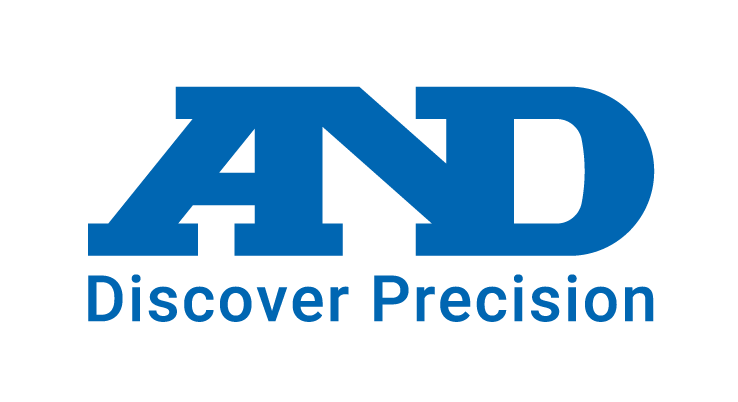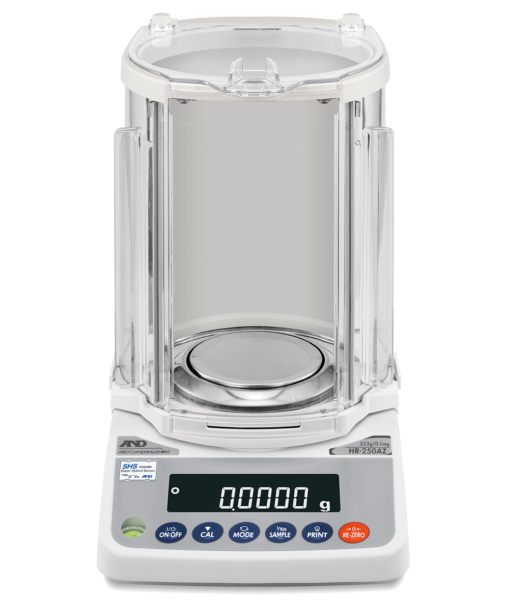Developing the AD-1687 Weighing Environment Logger
A&D has developed a new weighing environment logger, the AD-1687. This logger can simultaneously and chronologically record weighing values and the following environmental factors: temperature, humidity, atmospheric pressure, and vibration. This installment of the development story series explains the circumstances behind the planning and development of this product, our development goals, and the demands of the market.

As can be expected, environmental conditions that influence the performance of weighing instruments are recorded in labs that use analytical balances. This is done because the minimum display of analytical balances is 0.1 mg (1/10, 000 of a gram) or less. Furthermore, the resolution, which is the capacity divided by this minimum display, has reached 2 to 20 million to 1, and, as a result, standard weighing instruments require incredibly high resolutions and are very sensitive to their surrounding environments.
As a side note, pen recorders and recording paper were long used in manner similar to a meteorograph to record temporal changes in temperature, humidity, and atmospheric pressure. Our balance development team also used a meteorograph for a long time. However, we would have troubles recording data in this way, such as paper or ink running out and being unable to record at critical times. Another problem was that the data was difficult to handle and couldn’t be processed freely. For instance, the weighing data had to be checked using an analog readout, which made it difficult to determine the values, and the results obtained couldn’t be graphed. These issues created a demand for devices that can record various meteorological parameters digitally. Due to this demand, various types of loggers that can record data such as temperature, humidity, and atmospheric pressure were developed and are used in many labs and production facilities today.
These circumstances exist at all sites that use weighing instruments. In particular, users of weighing instruments use instruments that measure these environmental parameters in locations where balances and scales are used in order to verify calibrations of weighing values over a long period or evaluate basic performance such as repeatability by reference to the environmental data.
Meanwhile, when users at weighing sites want to link environmental and weighing data and graph the results or process the values, they find it difficult to integrate data from various recording devices. While data can be recorded to a PC to guarantee extensibility, dedicating a PC for this purpose is wasteful. In addition, special software has to be used, which makes this method complicated. There are also many other inconveniences to deal with, such as procedural rules against bringing PCs into environments such as clean rooms and security rules against bringing storage media like USB sticks into work sites.
To solve these problems, we had to find a way to collect and manage weighing data from the balance and environmental data like temperature, humidity, atmospheric pressure, and vibration from the setup environment.
Consequently, we planned and developed a logger that had never been offered before–one that can simultaneously record weighing data and setup environment data. Several years earlier, we had developed the AD-1688, a logger that records weighing data only. This time, however, we decided to develop a more advanced logger, which became the AD-1687 weighing and environmental data logger. During development of this logger, we encountered some difficult-to-handle parameters that were outside our areas of expertise, such as temperature, humidity, atmospheric pressure, and vibration. However, we solved these problems relatively easily by using recently released compact sensors that output data digitally.
When the AD-1687 is connected to a weighing instrument, weighing data (zero point and weight value) and the time, temperature, humidity, atmospheric pressure, and vibration are simultaneously recorded each time the Print key is pressed. Even when the logger is not connected to a weighing instrument, it can be used to log environmental data in locations ranging from clean rooms and labs to production facilities. In addition, by connecting the AD-1687 to a PC, recorded data can be imported into software such as Microsoft Excel for data analysis without using special data transfer software. When AD-1687 is connected to a PC, the PC recognizes it as USB storage.
The trends of the data stored on the AD-1687 can be graphed using automatic scaling and the display of environmental data for example can be limited to temperature and humidity. Furthermore, acquired data saved to a PC can be used to calculate span values and repeatability from span values. Thanks to these features, the AD-1687 is more than just a data storage device. It is a tool to proactively evaluate weighing environments.
While the AD-1687 is not tiny, it is compact and portable. To take advantage of its portability, we gave the AD-1687 heavy duty specifications. It has an IP65 waterproof construction (main unit) and enough shock resistance to avoid breakage from falls from as high as 1.5 m. We made the logger this tough because we assumed it would be used for the measurement of factory waste water and various other difficult measurement situations.
This industry-first weighing and environment logger answers the latent demands of people working where weighing instruments are used. Because of its utility, we believe that the AD-1687 offers many benefits for locations where weighing is performed and will be acknowledged as a helpful weighing management tool.


